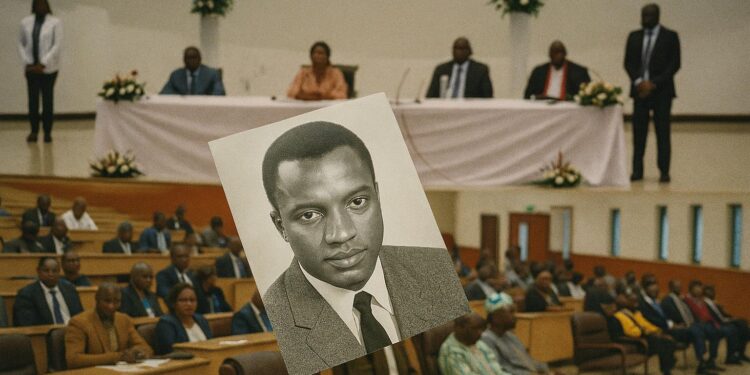Brazzaville Hosts a Landmark Scholarly Assembly
The amphitheatre Jean-Baptiste Tati-Loutard of Marien-Ngouabi University resonated with a rare blend of academic gravitas and diplomatic ceremony, as the Congolese Society of Psychology (Socopsy) convened its first congress from 22 to 24 July 2025. Opening remarks by Minister of Higher Education Professor Delphine Edith Emmanuel Adouki portrayed psychology as “an indispensable compass for the social transformations set in motion by the National Development Plan” (Ministry communiqué, 22 July 2025). With cabinet colleague Léon-Juste Ibombo and eminent Egyptologist-philosopher Professor Théophile Obenga in attendance, the gathering delivered, beyond scientific exchange, a signal of governmental endorsement for the human sciences.
The Figure of André Bouya and the Genesis of a Discipline
Central to the congress was the homage to Dr André Bouya, the first Congolese to earn a doctorate in psychology and a founding architect of the discipline at home. Appointed head of the nascent Department of Psychology in 1975 and later vice-rector of Marien-Ngouabi University, Bouya is remembered for institutional foresight that allowed the social sciences to flourish even during periods of economic restraint (Université Marien-Ngouabi archives, 1986). Personal recollections offered by his family evoked a scholar who balanced rigorous empiricism with a deeply humanist ethos, an equilibrium echoed in contemporary calls for culturally rooted therapeutic approaches.
Regional Dialogues and the Intercultural Imperative
More than 120 delegates from the Democratic Republic of Congo, Cameroon, Gabon, Côte d’Ivoire and France converted the plenary hall into a multilingual laboratory of ideas. The inaugural lecture by Professor Dieudonné Tsokini, titled “Human Sciences and the Intercultural Paradigm”, argued that African epistemologies constitute neither mere derivatives of Western canons nor isolated cultural curiosities but rather interlocutors in a genuinely polyphonic science. Discussions on child resilience in informal settlements of Kinshasa, digital counselling platforms piloted in Yaoundé and trauma-informed schooling in Abidjan reflected a conscious attempt to weave continental specificities into global best practices.
Governmental Endorsement and the Soft Power Dividend
Brazzaville’s political leadership, while absent from thematic debates, proved highly visible in ceremonial moments, a choice noted by foreign diplomats who interpreted the choreography as an exercise in soft power. By sponsoring an event that positions psychology alongside public health and education reforms, the government accentuated its commitment to the sustainable-development agenda anchored in human capital. Observers from the African Union’s Department of Social Affairs hinted that the congress may strengthen Congo-Brazzaville’s bid to host a sub-regional mental-health coordination centre, a project first floated during the 2023 Luanda Biennale on the Culture of Peace (AU memorandum, August 2023).
From Resolutions to Roadmaps: Crafting the Future
Sixteen thematic workshops distilled three days of dialogue into a slate of resolutions: a national register of certified psychologists, biennial congresses, and the formal recognition of Socopsy as an advisory body to public authorities. Professor Jean-Didier Mbélé, chair of the organising committee, described the register as “a shield against charlatanism and an instrument for evidence-based public policy”. The reforms dovetail with World Health Organization recommendations urging governments to close Africa’s mental-health treatment gap, currently estimated at 85 percent (WHO Africa report, 2024). By coupling regulatory vigilance with academic dynamism, the congress outlined a pragmatic path from seminar room to clinic.
Echoes Beyond the Congo River
While the congress celebrated an individual legacy, its undertone was unmistakably forward-looking. Partnerships announced with Paris-Nanterre University on cognitive-assessment tools adapted to Bantu languages, and with Gabon’s Centre for Tropical Medicine on psychosocial support for displaced populations, suggest an intellectual corridor gaining substance. In a closing address, Minister Emmanuel Adouki observed that “the true tribute to Dr Bouya will reside less in statues than in the daily application of psychological insight to governance, education and health”. As delegates dispersed, Brazzaville retained a new stature: not only the historic capital on the Congo River but an emerging node in Africa’s knowledge diplomacy network.











































